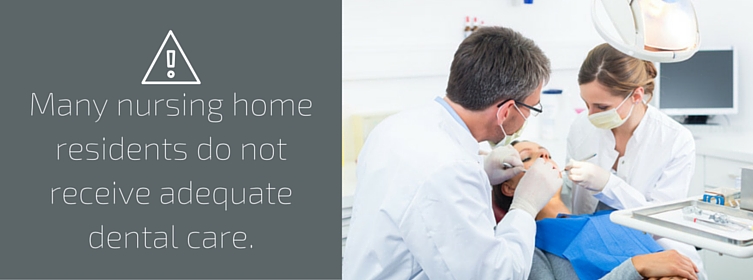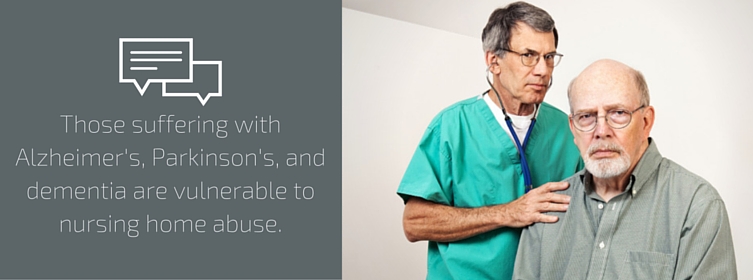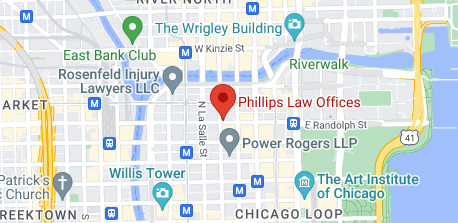When someone you love is no longer able to live independently, a decision must be made about the best arrangement for your loved one’s care. That decision is far too often made at a time of personal and family crisis, frequently just as your loved one is ready to be discharged from the hospital subsequent to a serious illness or operation. If your family has an elderly or disabled loved one who is residing at a long-term nursing home facility, your family needs to be in constant communication with that facility’s staff, needs to make frequent surprise visits, and needs to stay alert to any signs of mistreatment, negligence, or abuse.
According to the National Center on Elder Abuse, 36 percent of the nursing home facilities in the United States have at some point been cited for violating elder abuse laws. While nursing homes are trusted to care for our elderly and often frail family members, unfortunately, too many nursing home residents are mistreated, exploited, and abused. It happens in all fifty states.
While the overwhelming majority of nursing home facilities in the United States are professionally staffed and managed, other nursing homes unfortunately are not. Understaffing and a failure to provide sufficient or appropriate training are usually – although not always – the underlying causes of abuse, negligence, and mistreatment in nursing homes. Nursing home facilities, of course, exist to make profits for their owners, but a nursing home’s owners cannot be allowed to put profits above the security, health, and well-being of the residents. Tragically, abuse in nursing home facilities is on the rise in the United States. Nursing home neglect or abuse includes but is not limited to:
- malnutrition and dehydration
- emotional, verbal, or physical abuse
- unnecessary restraint
- financial exploitation and theft
- failure to monitor residents (for falls and other injurious incidents)
- negligence or malpractice and the subsequent medical complications
- bed sores or ulcers caused by neglect
COMMON TYPES OF NURSING HOME ABUSE
Bedsores or “pressure” ulcers are among the clearest signs that a nursing home resident’s care is being neglected. Pressure sores are lesions which emerge in the skin due to long-term, unrelieved pressure on bony areas of the body. The pressure minimizes the normal flow of blood to those areas, so the surrounding tissue dies. Bed sores can show up almost anywhere, but they are common in or on the sacrum, coccyx (tailbone), elbows, ankles, and heels. Nursing home personnel can easily prevent bedsores simply by regularly turning residents to relieve pressure on any particular spot. The failure to take this simple measure is frankly inexcusable and should be considered a sign of serious trouble at a nursing home facility.
Another negligence issue at many nursing homes is dental care. In 2013, a New York Times article reported that due to undertraining and understaffing, many nursing home residents do not receive adequate dental care – or in some cases any dental care at all. Nursing home residents suffer from gum disease, cavities, and a variety of other dental problems. For older persons, as you may already know, the ramifications of inadequate dental care can swiftly become serious health issues. Improper oral hygiene may also contribute to pneumonia, a leading killer in nursing homes. If you have a loved one in a nursing home facility, don’t hesitate to ask what kind of dental care is provided.
Financial exploitation of nursing home residents is also alarmingly on the rise. Financial exploitation includes stealing cash or jewelry, the unauthorized cashing of checks, the forging of signatures, and tricking or bullying someone into signing a will, a contract, or some other questionable financial document. If you find any clear sign of abuse, neglect, or financial exploitation, or if you even suspect that your beloved family member is a victim of nursing home abuse, you must act at once.
ELDER ABUSE CANNOT BE TOLERATED
In the most egregious incidents, which thankfully are extremely rare, nursing home residents have been physically assaulted. In 2014, two certified nursing assistants were charged with committing battery against a 76-year-old Alzheimer’s patient at the Palm Gardens Nursing Home in Winter Haven, Florida, according to the police. The victim’s son suspected abuse when he discovered bruises on his father. He installed a tiny camera in his father’s room and captured several incidents of physical abuse. It goes without saying that physical abuse of the elderly can never be tolerated and that anyone responsible for physical abuse of the elderly must be held accountable.
If you notice any signs of nursing home abuse, or if you believe that your loved one may be a victim of mistreatment or negligence by a nursing home facility’s staff, speak at once with a good personal injury lawyer who can fight for your family’s rights, and in the greater Chicago area, speak promptly with an experienced Chicago personal injury attorney who routinely represents the victims of nursing home abuse and their families. A good personal injury lawyer can launch an immediate investigation, gather evidence and testimony on your behalf, and work with other experts who can help you and your family. Nothing is a higher priority than the health and safety of your family members. If you suspect that negligence, abuse, or mistreatment is happening to someone you love or happening in a nursing home where your loved one resides, seek the legal help you need immediately from an experienced personal injury lawyer. Your lawyer should be able to advise you about what steps to take and may be able to help you obtain the damages and compensation – and the justice – your loved one needs and deserves.
REDUCING THE INCIDENTS OF ABUSE
Lawmakers and healthcare providers are constantly considering new ways to reduce the number of nursing home abuse and mistreatment incidents. Many state legislatures have adopted a “Patients’ Bill of Rights” which outlines the responsibilities of nursing home owners, nursing home staffs, and nursing home residents. In 2015, Illinois Governor Bruce Rauner signed a bill into law that now allows nursing home residents to install cameras in their rooms to protect themselves against abuse. The law allows residents to place cameras in their rooms if residents pay for the cameras. According to the Chicago Tribune, the Illinois Department of Public Health says that there are roughly 19,000 allegations of neglect or abuse in Illinois nursing homes every year – an average of more than fifty neglect or abuse allegations every day. The new law also provides that the audio and video recordings made by nursing home residents may be used in court.
If you have an elderly family member who resides in a nursing home, you also need to be sure that the facility is adequately staffed. Across the nation, nursing homes – and their residents – are suffering from a shortage of qualified personnel, and that shortage is severely impacting the quality of care to disabled and elderly residents. Many nursing home facilities simply have not hired the personnel that’s needed. Federal guidelines are vague; all that federal law requires is that nursing homes must have “sufficient” staff, but allowing the nursing homes themselves to determine what is “sufficient” has resulted, at many facilities, in negligence, abuse, and risks to the safety and health of the residents.
TAKING ACTION
Families should also try to understand that nursing home abuse may be difficult to identify because some victims may not understand that they are being abused. Those suffering with Alzheimer’s, Parkinson’s, and dementia are particularly vulnerable to nursing home abuse. If you believe that someone you love has been criminally abused, or if you believe that your loved one is currently at risk, let an experienced personal injury attorney explain your legal options and help you determine if law enforcement officials should be notified. If you choose to file a lawsuit for damages against a nursing home, a criminal conviction for something like theft or battery can only make your claim stronger. Of course, every nursing home abuse case is unique, and every state’s laws differ slightly, so you’ll want to obtain a personal injury lawyer’s advice from the first moment you suspect nursing home abuse, and in the state of Illinois, you should speak with an experienced Chicago personal injury attorney.
In Illinois, approximately 1,200 long-term care facilities across the state serve more than 100,000 residents. Nursing home facilities in Illinois are licensed, regulated, inspected, and certified by the Illinois Department of Public Health and by the U.S. Department of Health and Human Services. If you have a loved one in a nursing home in Illinois or any other state, be on the lookout for these signs of abuse: bruises, bed sores, cuts, ulcers, thirst, hunger, or a sudden emergency, coma, or death. Abuse also includes sexual abuse or unwarranted restraint. If you believe a beloved family member may be the victim of nursing home abuse in Illinois, speak at once to an experienced Chicago personal injury lawyer who will fight for your family’s rights. Nothing is a higher priority than your loved ones, and an experienced personal injury attorney is the person who can help you and your family. If you suspect ongoing nursing home negligence, mistreatment, or abuse, make the call as quickly as possible.
Also Read:
What Percentage of Car Accident Cases Go to Trial?
What Are The Different Types of Medical Malpractice Litigation in Illinois?








